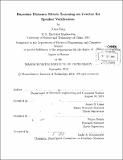Bayesian distance metric learning on i-vector for speaker verification
Author(s)
Fang, Xiao, Ph. D. Massachusetts Institute of Technology
DownloadFull printable version (12.05Mb)
Other Contributors
Massachusetts Institute of Technology. Department of Electrical Engineering and Computer Science.
Advisor
James R. Glass and Najim Dehak.
Terms of use
Metadata
Show full item recordAbstract
This thesis explores the use of Bayesian distance metric learning (Bayes_dml) for the task of speaker verification using the i-vector feature representation. We propose a framework that explores the distance constraints between i-vector pairs from the same speaker and different speakers. With an approximation of the distance metric as a weighted covariance matrix of the top eigenvectors from the data covariance matrix, variational inference is used to estimate a posterior distribution of the distance metric. Given speaker labels, we select different-speaker data pairs with the highest cosine scores to form a different-speaker constraint set. This set captures the most discriminative between-speaker variability that exists in the training data. This system is evaluated on the female part of the 2008 NIST SRE dataset. Cosine similarity scoring, as the state-of-the-art approach, is compared to Bayes-dml. Experimental results show the comparable performance between Bayes_dml and cosine similarity scoring. Furthermore, Bayes-dml is insensitive to score normalization, as compared to cosine similarity scoring. Without the requirement of the number of labeled examples, Bayes_dml performs better in the context of limited training data
Description
Thesis (S.M.)--Massachusetts Institute of Technology, Dept. of Electrical Engineering and Computer Science, 2013. Cataloged from PDF version of thesis. Includes bibliographical references (pages 63-66).
Date issued
2013Department
Massachusetts Institute of Technology. Department of Electrical Engineering and Computer SciencePublisher
Massachusetts Institute of Technology
Keywords
Electrical Engineering and Computer Science.